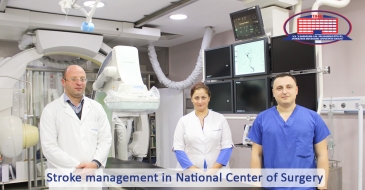
For the first time in the region, a procedure was established in National Center of Surgery that will save the lives of numerous patients.
In the news, you will be informed about the following:
In Endovascular Department of the clinic, the following was conducted: retrograde recanalization of a brachiocephalic vein (restoration of blood flow, opening of blocked blood vessel), dilation (bulging), and, also dialysis catheter implantation in superior vena cava – it’s worth mentioning that angiosurgeons used special ultramodern device Surfacer during operation.
Clinical case and diagnosis
The patient's health condition was extremely severe before being admitted to the clinic. Hemodialysis was the only option to save the patient's life due to chronic kidney failure diagnosis, but the patient's magistral veins were occluded (blocked) and a new hemodialysis catheter couldn’t be placed.
What is kidney failure?
Kidney failure is a syndrome that presents a deterioration of all primary renal functions and as a result develops disruption of sodium, nitrogen balance and other metabolic disorders.
It’s worth mentioning that in chronic kidney failure, the kidney gradually loses its function, particularly, the organ cannot filter waste and excess liquids in the body, subsequently excess liquid, electrolytes and waste accumulate in the body.
Uremic toxins are excreted through hemodialysis catheter or surgically created arteriovenous fistula.
Why couldn’t full course of dialysis be conducted?
The patient had several arteriovenous fistula operations and there were no resources for the formation of the new one.
Standard central venous catheter placement couldn’t be conducted as well due to complete occlusion (blockage) of veins – Given the condition, it was impossible to use already established technologies and clinical case required a new approach!
Traditional methods for restoration of central vein pathway such as a balloon, stent, guidewire, etc were without results.
Moving the patient to peritoneal dialysis was discussed as well because dialysis was of vital importance.
In peritoneal dialysis uremic toxins and excess liquid are excreted from the blood through the lining of the abdomen. This form of dialysis couldn’t be conducted because of risk factors (excess weight, diabetes, several operations conducted on abdominal cavity) and the probability of peritonitis (a disease characterized with local or diffuse inflammation of the serous lining of the abdominal cavity).
As the Head of the Endovascular Department of National Center of Surgery, Angiosurgeon Giorgi Jinchveladze stated in an interview with us, the patient had several dialysis catheters placed in almost all magistral veins, albeit it was necessary to remove all of them due to infections and narrowing of magistral veins.
Unique treatment method
Mr. Giorgi stated – "With the leadership of National Center of Surgery, a team of Endovascular Department and international experts' involvement, it was feasible to conduct exclusive and non-standard operation using advanced technology comprising retrograde recanalization of brachiocephalic vein approached from the femoral vein, dilation, dialysis catheter implantation in superior vena cava. Our clinic will save the lives of many patients with this advanced method".
It’s worth mentioning that operation progressed without any complications and today the patient's health condition is stable.
Patient receives a full course of hemodialysis and feels well.
Wish you health!
















